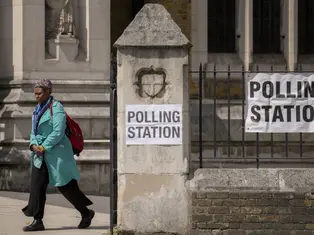top of page
Articles


Waiting for Saddam
One of Adolf Hitler’s favourite musicians was Richard Wagner. His thunderous compositions were meant to instil a violent pride within the...

Keshav Srinivasan
6 min read


‘A heap of broken images’: The Possibility of Connection in TS Eliot’s The Waste Land
Eliot’s work is filled—especially the poetry—with masks, role-playing, and multiple voices. Yet it is saturated everywhere, too, with...
Asseel Darwish
15 min read


Famous Lost Artworks
Modern commerce takes place at supersonic speed. It therefore surprises many that most of the world’s traded goods are still, at some...

Serhan Handani
8 min read


The Cultural Logic of Statues
A statue tumbles and, with an almighty splash, sinks below the water. Those responsible cheer with joy. Onlookers are captured in a range of emotions: confusion, rage, wonder. What is taking place? Is this an anti-historical act of violent vandalism, or the liberating removal of a relic of the colonial era, an enduring reminder of oppression? When Black Lives Matter protesters in Bristol toppled the statue of the merchant and slave trader Edward Colston in June 2020, it was

Jack Graveney
12 min read


Steering the Royal Academy in Pandemic Times: In Conversation with Axel Rüger
Axel Rü̈ger is Secretary and Chief Executive of the Royal Academy of Arts. He is a former Director of the Van Gogh Museum in Amsterdam...

Louisa Stuart-Smith
6 min read


Leonardo the Myth alongside Leonardo the Architect
Leonardo da Vinci is a constant of the Western cultural tradition. We grow up with a vague sense of Leonardo’s achievements, knowing him...

Ruairi Smith
10 min read


We the People? The Conservative National Identity and its Role in American Political Polarisation
Identity drives human agency. Who we consider ourselves and the groups we are part of determines the choices we make. This principle is...

Christopher George
13 min read


Institutions for the Long Run: Taking Future Generations Seriously in Government
Introduction This article sets out the case for taking future generations seriously through our political institutions. We make three central claims. First, future people matter, and political institutions ought to reflect this. We make this case by appealing to the importance of broad political enfranchisement, and then to the more general moral significance of future people. Second, our political institutions do not yet take the interests of future generations sufficientl

Fin Moorhouse and Luca Righetti
26 min read


Remediation
The will to transparency, the scopic drive to see through, to scrutinise naked truth, encounters a significant impediment in the dead letters, the literae mortuae , of law. The puppet show of juridical interpretation, the marionettes that are pulled as heavy signifiers, gothic black-letter dogmas from the pickle jar of precedent, perform a spectacle that is always a trope and costume, a stage and screen away from the viewing subject. As the pop philosopher and ‘narcotheorist’

Peter Goodrich
21 min read


Egalitarianism and the Neoliberal Work Ethic: In Conversation with Professor Elizabeth Anderson
John Dewey Distinguished University Professor and Arthur F. Thurnau Professor of Philosophy and Women’s Studies at the University of Michigan, Elizabeth Anderson is famously redefining egalitarianism in the field of political philosophy. Conventionally, philosophical debate has imagined the two concepts of equality and freedom to be polar opposites. Anderson has sought to challenge this perception by subordinating the popular egalitarian notion of distributive equality to tha

Teresa Turkheimer
15 min read


The Retrial of Dante: In Conversation with Count Sperello Alighieri and Antoine de Gabrielli
Count Sperello di Serego Alighieri is an astronomer descended from Dante Alighieri, author of the Divine Comedy . Antoine de Gabrielli is a prominent French businessman descended from Cante dei Gabrielli, the judge who condemned Dante to exile. Dante Alighieri lived from 1265 to 1321. During his lifetime, he was a pharmacist, a poet, and a politician. His study of medicines nourished an already scientific mind and allowed him to stock pharmacy shelves with his works. (Bo

Alexander (Sami) Kardos-Nyheim
10 min read


The Sacred and the Profane
Fig 1. Sacred and Profane Love (Titian 1514, oil on canvas). Wikimedia Commons. <https://commons.wikimedia.org/wiki/File:Tiziano_-_Amor_S...

Matthew Sargent
10 min read


Art Law at Christie’s: In Conversation with Maggie Hoag
Maggie Hoag is Deputy General Counsel, Americas, at the auction house Christie’s. She studied art law at Stanford, and was involved in...

Alexander (Sami) Kardos-Nyheim
6 min read


Does Pornography Silence Women?
In Indianapolis in 1984, an unusual political alliance was formed. On one side was the staunchly conservative city council and on the...

Adam Rachman
10 min read
bottom of page

